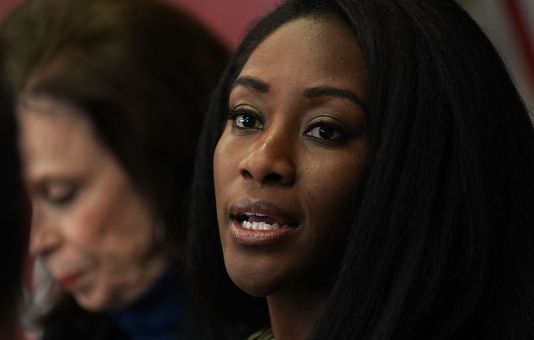The Washington Post editor who worked with Jamal Khashoggi is not buying the story from Saudi officials who say the columnist died during an altercation at Saudi Arabia’s consulate in Istanbul.
“I still believe, and the Post as an institution still believes, that this is not an explanation. This is an attempt at a cover-up,” Karen Attiah, the global opinions editor at the Post, told George Stephanopoulos Sunday on ABC’s “This Week.”
The Saudi government claimed in a statement on Friday that Khashoggi went to the consulate because he was interested in returning to Saudi Arabia. The statement said that the “discussion” led to a quarrel and that Khashoggi died in an ensuing “brawl.”
Attiah said it was “absolutely untrue” that Khashoggi wanted to return to Saudi Arabia. She also rejected the notion that Khashoggi, whom she described as “kind and calm and gentle,” would have been involved in a brawl.
The Washington Post Editorial Board wrote on Saturday that “the new account offered by the regime of King Salman and Crown Prince Mohammed bin Salman is utterly devoid of credibility.” The editorial said the evidence was clear that the prince was “the instigator of a premeditated, cold-blooded and brutal murder, followed by the dismemberment of Mr. Khashoggi’s body.”
The Post called for investigations in Khashoggi’s death by the United Nations and Congress, “including of whether the Trump administration is conspiring with Saudi officials to cover up the murder of a distinguished journalist.”
Later Saturday, Trump said that “obviously there’s been deception and there’s been lies” from the Saudis. “Their stories are all over the place.”
But the president also defended Mohammed bin Salman as a positive political figure in Saudi Arabia and said he had seen evidence implicating, or exonerating the prince. Trump said it was possible things “went awry” in the consulate and that the prince only learned what happened later.
Surveillance video showed Khashoggi enter the consulate on Oct. 2. He never emerged from the building, but the Saudi government denied any knowledge of his fate for more than two weeks.
Khashoggi’s columns were often critical of the Saudi regime and he advocated democratic and educational reforms both in the nation and more broadly across the Arab world.
Attiah said Khashoggi, a Saudi national who resided in Virginia, was a moderate critic who actually rejected the label of “dissident” and wanted to offer “constructive criticism” in order to get Saudi Arabia “on the right path.”
She speculated that as a former insider with close ties to the regime, “this was maybe part of an attempt to silence what he might have known about the inner workings of the Saudi royal family.”
“We do know that his writing for the Post especially irritated those back in Riyadh,” she said.
























Leave a comment